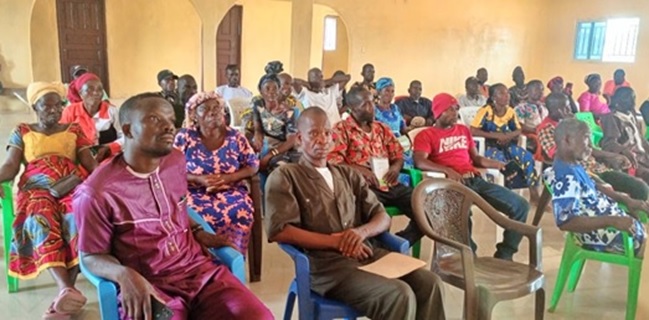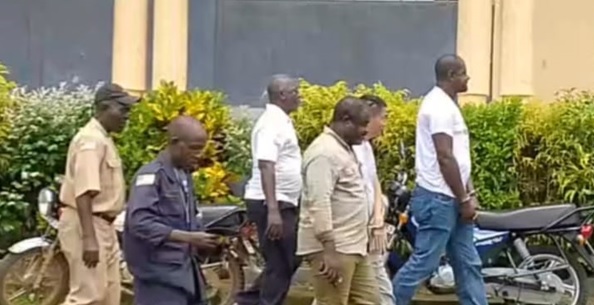By Jerome Saye with the Liberia Forest Media Watch
The 2009 Community Rights Law (CRL) gives community the right to control, protect, manage and develop their forest and its resources. In order to effectively manage their forest, the CLR empowers community to set up leadership structures. The structures include, Community Assembly (CA), Executive Committee (EC) and Community Forest Management Body (CFMB). The CA is the highest decision-making body of the Community Forest, the EC is responsible to supervise the work of the CFMB and reports to the CA, while the CFMB oversees the day-to-day activities of the community forest.
While these structures are formulated to manage the community forests, some of them are engulfed with leadership deficits raging from internal conflict to neglect of official responsibilities amid efforts by local and international partners to strengthen their capacities.
One of the communities currently facing leadership challenges is the Sehyi Kodoo Authorized Community Forest located in Nimba County, Northern Liberia. Some officials of the Community Forest Leadership are found to have neglected their official duties thus affecting the smooth operations of the leadership. “Their consistent absence and lack of participation in essential meetings and activities are seriously undermining our collective efforts”, EC’s Chair, James N. Domah told the Liberia Forest Media Watch in an interview.
Officials who have abandoned their duties are the General Secretary of the CFMB, Oretha Y. Nahn, Oscar Gono and Helena Kehwailain, both of whom are members of the CA. These officials are said to have neglected their official responsibilities for the past eight months. This incident marks a major moment of discord within the community leadership which is tasked with the responsibility to manage Community Forest.
The EC Chairman, Domah, explained that the officials in question have repeatedly failed to fulfill their duties, thereby undermining the effective management of the community forest. He accused the three officials of working with different entities.
A probe by LFMW found that the three officials are full-time employees of their respective entities. Oscar Gono is a full-time school teacher and Oretha Y. Nahn is an employee of Afcons, a Construction Company. As for Helena Kehwailain, she looked unworried as she refused to respond to the allegation against her. “But we will wait to see what happens next”, said Helena.
“Their consistent absence and lack of participation in essential meetings and activities are seriously undermining our collective efforts,” Mr. Domah lamented. In an effort to remedy the situation, the EC Chairman, James N. Domah said he had declared neglected positions vacant and is seeking applications from interested individuals to fill the vacant posts.
But those accused have denied the allegation of neglecting their duties. In an interview with LFMW, Oretha Y. Nahn strongly denied the accusation saying that she has consistently fulfilled her duties despite her work with Afcons.
“Right now, I’m still serving as the secretary general. I see no reason that somebody will tell me say I am not working,’ said Mrs. Nahn. According to her, working for a different entity will not impede her function on the community forest leadership. She noted that she has been working with Afcons while at the same time working with the community forest to sign the Memorandum of Understanding with Accelor Mettal Liberia, and subsequently opening of the community account. “So it is only today that I am not working because money is in the account?” she asked.
Oscar Gono admitted to being a full time School Teacher, but said he remained committed to ongoing efforts to foster collaboration and communication within the leadership and community. “I am teaching and I was teaching before been elected as a member on the CF, so that cannot be the reason for my removal”, Gono said. Gono noted that that there is no provision in the forest management law that prevents him from working with different entity and at the same time working for the community forest body. He challenged the EC to show backing for his removal. “There is no part of the community forest law or CRL that says when you are working else where you can’t work in this CFMB,” said Gono.
Helena Kehwailain who appears untroubled said she is waiting to see what happen next. “We will wait to see what happens next”. Helena noted. Both Oscar Gono and Oretha Nahn have accused their EC Chairman of trying to remove them unilaterally in order to bring his own people to work with him now that Arcelor Mittal has provided funding for reforestation in the affected communities.
The Chief Officer of the CFMB, Ericson N. Flomo confirmed that the three officials have neglected their assignments. He said he supports the decision of the Chairman of the Executive Committee to remove the three officials, Helena Kehwailain, Oscar Gono and Oretha Y. Nahn). According to Flomo, the decision to remove them was reached at community meeting. The Chief Officer, emphasized the importance of the position of Secretary General to community forest leadership. “Even in the little club that people do, secretary is key to documentation.
A local community leader, Clan Chief, Annie Wehyee registered her disapproval for the removal of the community forest officials. She stressed the need for the EC to work with their colleagues because, she said they have long suffered together as volunteers and it was now time for all of them to benefit from their labors as AML has begun partnering with the body. Clan Chief Annie noted that removing those officials will be considered a disrespect to the local authorities even though the CRL limits the participation of local officials in community forest matters.
But what does the law say about the removal or dispute resolution within community forest? Chapter 7 section 7.2 of the CRL says, where there are reasonable allegations that a Community Forest Management Body or any of its members is mismanaging community forest resources or has engaged in misconduct or misappropriation of the community forest funds, the Executive Committee, with the technical support of the Authority shall conduct an investigation and prepare a comprehensive report.
Chapter 8 says any dispute arising between two or more communities, and authority, communities and third parties, about the access to or management of community forest resources may be resolved through customary dispute resolution mechanisms or by the application of the arbitration Law of Liberia as found in Chapter 64 of the civil procedure law.
Also, section 6 of the bylaw and constitution of the Sehyi Kodoo Authorized Forest Community states that Members of the CFMB who are found to be incapable of effectively performing the duties of their office may be removed by a vote of two-third of the Community Assembly membership of 36 persons, at a properly constituted Special meeting of the Community Assembly. Prior to such a vote, the member of the CFMB shall be given an opportunity to respond to any charges that they are unable to effectively perform their duties. In the event a member’s employment with the CFMB is terminated, all relevant Liberian Labor Laws shall be followed.







